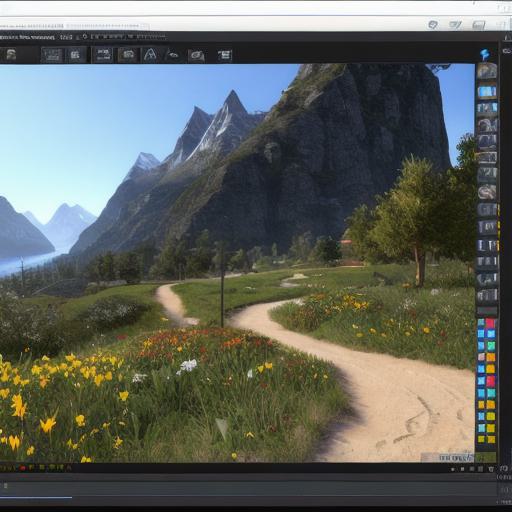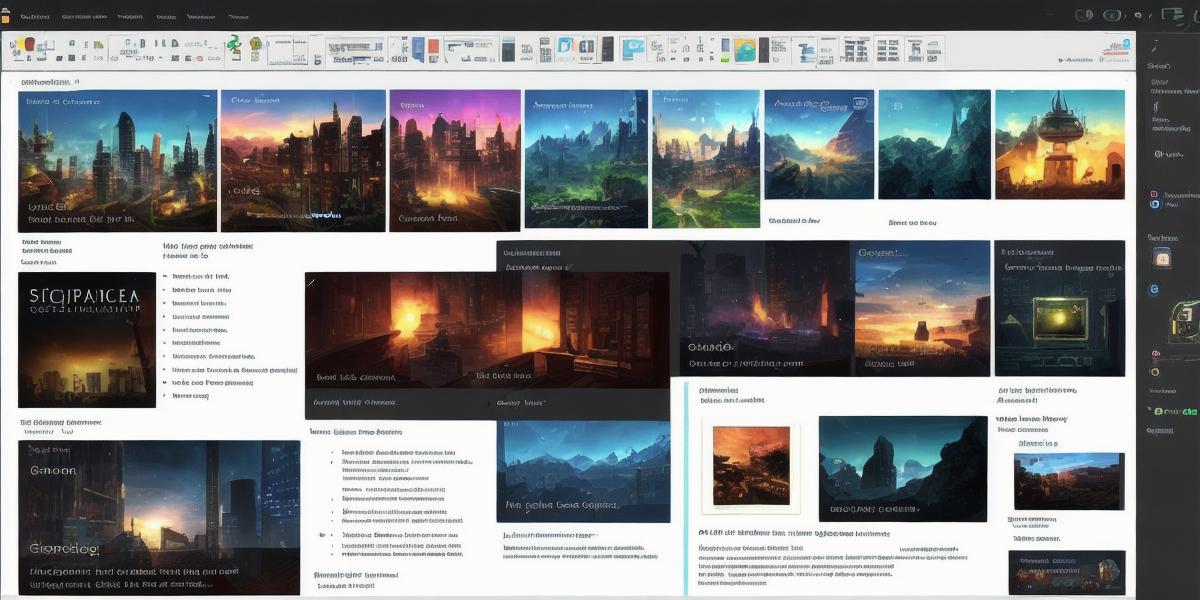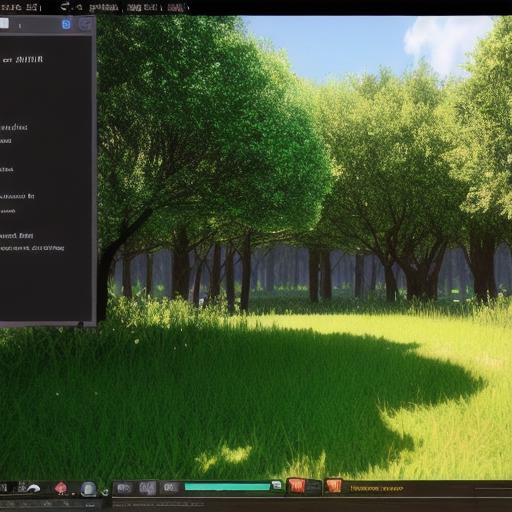Game development is a rapidly growing industry that requires creativity, technical skills, and passion for creating immersive gaming experiences. If you are looking to get started in this exciting field, this comprehensive guide will provide you with the essential information and resources you need to succeed. In this article, we will cover the following topics:
- Introduction to game development
- Understanding the different types of game development
- Choosing your game development platform
- Learning the basics of game development
- Building your first game
- Marketing and distribution of games
- FAQs for getting started with game development
Let’s dive in!
- Introduction to Game Development
Game development involves creating interactive games for various platforms, including consoles, computers, mobile devices, and virtual reality systems. The process involves designing game mechanics, creating game assets, programming code, testing the game, and marketing it to the target audience.

The game development industry has seen significant growth in recent years, with an estimated 2.3 billion gamers worldwide. With such a massive market, game developers have the opportunity to create games that appeal to various audiences and generate revenue through advertising, merchandising, and other monetization strategies.
- Understanding the Different Types of Game Development
There are several types of game development, including:
a. 2D Game Development: This type involves creating games with flat graphics, typically using software like Adobe Flash or Unity. Examples of 2D games include Super Mario Bros and Pong.
b. 3D Game Development: This type involves creating games with three-dimensional graphics, typically using software like Unreal Engine or Unity. Examples of 3D games include Fortnite and The Legend of Zelda: Breath of the Wild.
c. Mobile Game Development: This type involves creating games for mobile devices such as smartphones and tablets. Examples of mobile games include Angry Birds and Candy Crush.
d. Virtual Reality (VR) Game Development: This type involves creating games specifically designed for VR systems like Oculus Rift and HTC Vive. Examples of VR games include Beat Saber and Half-Life: Alyx.
e. Augmented Reality (AR) Game Development: This type involves creating games that use AR technology to superimpose virtual objects onto the real world. Examples of AR games include Pokemon Go and Snapchat Lenses.
- Choosing Your Game Development Platform
Choosing the right game development platform is crucial for creating a successful game. Some popular platforms include:
a. Unity: This is a cross-platform game engine that supports 2D and 3D games for various devices, including mobile, desktop, and VR. It has a large community of developers and a wide range of resources available.
b. Unreal Engine: This is another popular game engine that supports 2D and 3D games for various devices, including mobile, desktop, and VR. It is known for its high-performance graphics and advanced features like motion capture.
c. Construct: This is a visual programming tool that allows developers to create games without writing any code. It supports both 2D and 3D games and can be used for desktop, mobile, and web development.
d. Godot: This is an open-source game engine that supports 2D and 3D games for various devices, including mobile, desktop, and VR. It has a growing community of developers and offers advanced features like physics simulation and animation tools.
- Learning the Basics of Game Development
Before you start building your first game, it’s essential to learn the basics of game development. Some key skills to master include:
a. Programming: Game development often requires knowledge of programming languages such as C++, Python, or JavaScript. These languages allow developers to create game logic, control game objects, and manage user input.
b. Art and Design: Creating engaging game assets and designing an intuitive gameplay experience are essential for a successful game. Developers should have a strong understanding of art and design principles, including color theory, composition, and user interface design.
c. Game Mechanics: Understanding game mechanics is crucial for creating games that are fun and engaging. Developers should learn about concepts like player progression, level design, and enemy behavior to create a compelling gaming experience.
d. Testing and Debugging: Game development involves extensive testing and debugging to ensure the game runs smoothly and is free of bugs. Developers should learn how to use debugging tools and techniques to identify and fix issues in their code.
- Building Your First Game
Once you have learned the basics of game development, it’s time to start building your first game. Here are some steps to follow:
a. Define the Game Concept: Before you start coding, it’s essential to define the game concept and identify the target audience. This will help you design a game that resonates with players and meets their expectations.
b. Choose the Game Development Platform: Select the game development platform that best suits your needs and skill level. Consider factors like ease of use, performance, and community support when making this decision.
c. Create the Game Assets: Design the game assets, including characters, backgrounds, and sound effects. Use software like Photoshop or Blender to create these assets.
d. Write the Code: Using the programming language you have learned, write the code for your game. This will involve creating game logic, controlling game objects, and managing user input.
e. Test and Debug: Test your game thoroughly to ensure it runs smoothly and is free of bugs. Use debugging tools to identify and fix any issues in your code.
f. Publish the Game: Once your game is ready, publish it on the appropriate platform, such as the App Store or Steam. Promote your game through social media, gaming communities, and other channels to attract players.
- Marketing and Distribution of Games
Marketing and distribution are essential for getting your game noticed and reaching your target audience. Here are some tips for effectively marketing and distributing your game:

a. Identify Your Target Audience: Understand who your target audience is and what they are looking for in a game. This will help you tailor your marketing efforts to their interests.
b. Create a Marketing Plan: Develop a marketing plan that includes strategies for promoting your game on social media, gaming communities, and other channels. Consider creating a website or blog to showcase your game and engage with potential players.
c. Partner With Other Developers: Collaborate with other developers or influencers in the gaming community to promote your game to their audiences. This can be an effective way to reach new players and generate buzz around your game.
d. Offer Incentives: Consider offering incentives like free in-game items or exclusive content to encourage players to download and play your game.
e. Monitor Analytics: Use analytics tools to track player engagement and identify areas for improvement. This can help you optimize your marketing efforts and improve the overall success of your game.
- FAQs for Getting Started With Game Development
Here are some frequently asked questions to help you get started with game development:
a. What skills do I need to become a game developer? To become a game developer, you will need programming skills, artistic skills, and an understanding of game mechanics.
b. How long does it take to build a game? The time it takes to build a game depends on the complexity of the project, the size of the team, and the resources available.
c. Can I make money as a game developer? Yes, many successful game developers earn a living by creating and selling games.
d. What are some popular game development tools and platforms? Some popular game development tools and platforms include Unreal Engine, Unity, Construct, and Godot.
e. How do I test my game? To test your game, you can use debugging tools and techniques to identify and fix issues in your code. You can also invite beta testers to play your game and provide feedback.
In conclusion, game development is a challenging but rewarding field that requires creativity, technical skills, and a passion for gaming. By learning the basics of game development, choosing the right platform, and effectively marketing and distributing your game, you can create a compelling and successful gaming experience.



